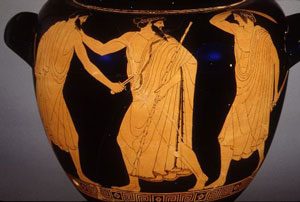
Who was Hippias? Harmodius and Aristogeiton attacking Hippias and Hipparchus
Hippias and Hipparchus
When the tyrant Pisistratus died in 528 BC, his two sons, Hippias and Hipparchus, took over ruling Athens as tyrants.
What is a tyrant?
A tyrant activity
Athens under the Tyrants
All our ancient Greece articles
Hippias seems to have taken care of most of the politics. His brother Hipparchus took care of religious matters and the gods. (We hear about this in Herodotus.)
Who was Herodotus?
Greek religion

Statues of Harmodius and Aristogeiton
Harmodius and Aristogeiton
But in 514 BC, two young rich men named Harmodius and Aristogeiton tried to kill the two tyrant brothers. They missed Hippias, but they did kill Hipparchus. Then their bodyguards killed Harmodius and Aristogeiton. Because they were dead, nobody could question them, and so nobody really found out why they did it. Were they paid by someone else? We don’t know.
Hippias exiled from Athens
After his brother was killed, Hippias got more and more suspicious of everyone around him. He thought everyone was plotting against him. And they kind of were.
Four years later, in 510 BC, another rich man called Cleisthenes, from the Alcmaeonid family, did succeed in getting the Spartans to help him throw Hippias out of Athens. Hippias went to live with the Persians, where he spent the rest of his life.
Who was Cleisthenes?
The curse of the Alcmaeonids
Who were the Persians?
Democracy comes to Athens
The Athenians thought of Harmodius and Aristogeiton as big heroes because they killed the tyrants, and brought in democracy. They put up these public statues of the “tyrannicides” – the tyrant-killers – to celebrate their achievement.
Athenian democracy
But another way of looking at these is that most tyrants – probably including Hippias – got power by promising to help ordinary people. And the leaders of Athens’ new democracy, like Cleisthenes, were other rich men. Did they help ordinary people as much as the tyrants?
Learn by doing: hold a debate: were Harmodius and Aristogeiton heroes?
More about the tyrants of Athens
Bibliography and further reading about Hippias and Hipparchus:
Oxford First Ancient History, by Roy Burrell and Peter Connolly (1997). Lively interviews and pictures make the ancient Mediterranean come to life. For teens.
The Oxford Illustrated History of Greece and the Hellenistic World, by John Boardman, Jasper Griffin, and Oswyn Murray (2001). For college students.
A Brief History of Ancient Greece: Politics, Society, and Culture, by Sarah Pomeroy and others (2004). This one might be a little more politically progressive than the Oxford history.